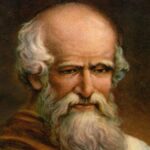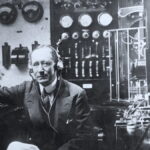The history of the invention of the radio is not fully enlightened. The honor of this important invention has been claimed in the names of dozens of leading scientists. Among those, the Italian Guglielmo Marconi was one of the most successful and important personalities. Guglielmo Marconi invented the radio and made it available to everyone.
Who is Guglielmo Marconi?
Guglielmo Marconi was born in Bologna, Italy, as the son of an Italian father and an Irish mother. He was interested in science at an early age, especially in the field of electricity. In late 1894, he learned about the experiments of the German physicist Heinrich Hertz (1857-1894). In the late 1880s, Hertz demonstrated the existence of radio waves.
Hertz produced radio waves by sending upward and downward alternating currents rapidly shifting from a vertical antenna, and he was able to monitor these waves for up to 20 meters. Marconi read an article about the recent demonstration by British physicist Oliver Lodge (1851-1940). Using Hertz waves, Lodge had sent wireless messages in Morse code. At that time, Morse’s telegraphic messages could only be sent by wire and using electric pulses. The possibility of using wireless telegrams impressed Marconi.
Marconi’s major purpose in conducting his own tests was to make the wireless telegraph a technology utilized in daily life. Marconi set up a laboratory in his house’s attic, gathering the required instruments. Soon, he was sending Morse code across greater distances and receiving responses: first inside his room, then to the end of the hallway, and then out into the countryside. Marconi delivered a message around 2 kilometers distant in the summer of 1895, and he patented the technique in 1896. He chose to relocate to England when the Italian government denied his financial help request.
Relationship between Guglielmo Marconi and Titanic
After a series of impressive demonstrations of the invention, Marconi received financial support from the Postal Administration, which was then responsible for the telegraph service in England. In the same year, he founded the Wireless Telegraph & Signal Company. Over the next few years, he was able to send messages over long distances, especially ship-to-ship and ship-to-shore.
In 1900, Guglielmo Marconi decided to expand the transmission range further. His new goal was to cross the Atlantic Ocean. In 1901, three short radio signals symbolizing the letter “S” in the Morse code were transmitted from Poldhu, in Cornwall, England, to St. John’s City, in Newfoundland (then an English colony, now part of Canada).
This successful transmission to St. John’s echoed across the world. A year later, when it was claimed that the transmission was fraudulent, he performed another experiment. This time, he was able to receive signals from Cornwall, which was more than 3200 kilometers away from his ship, close to the Canadian coast.
In the following years, Marconi launched the first radio transmission system. Marconi’s name was heard once more in 1912 when the British ship RMS Titanic crashed into an iceberg. A Marconi-radio operator on the sinking ship was able to send signals and ask for help from the surrounding ships.
The Inventor of the Radio
In the 1920s, Marconi began experimenting with high-frequency radio waves. These “short waves” could be focused by a curved reflector behind a transmitter, similar to parabolic receivers used to receive satellite broadcasts. Since the waves did not form in a beam and spread in all directions, this new arrangement made the radio much more effective and energy-efficient.
At that time, other radio operators like Marconi were able to transmit not only the Morse code but also speeches, music, and audio signals. In 1931, Marconi conducted experiments with radio waves (microwaves) of higher frequencies and shorter wavelengths. A year later, he established a microwave radiotelephone system that broadcast in a certain direction between the Vatican and the Pope’s summer residence. The infrastructure of the current communication system is based on similar microwaves.
Marconi did not actually invent the radio, but in many ways, he contributed to the development of the radio. His efforts have transformed the radio from a complex lab instrument to an everyday device with commercial success and made our world a little smaller. In 1929, he was awarded the Nobel Prize in Physics for his contributions to the field of wireless telegraphy. In 1930, he was elected President of the Royal Italian Academy.
Lee de Forest’s Audion tube
In the early 1900s, radio communication was only feasible by wireless telegraphy, that is, Morse code messages based on radio wave pulses of varying durations known as “dots” and “dashes.” This changed with the advent of audio transmission, and regular broadcasts started in 1920. Audion, created in 1906 by US inventor Lee de Forest, was one of the most crucial technologies for the development of audio broadcasting.
The earliest example of an electron tube was the Audion. It offered several application options, which aided in the creation of new electrical gadgets. Audion was involved in the development of entirely electronic “oscillators” capable of producing radio waves of any frequency in the area of radio and television transmission. Electron tubes were employed to increase the power of radios and TVs from the 1920s until the 1960s. Transistors, which were created in 1947 and used less energy, took their place.
Quotes
“In the new era, thought itself will be transmitted by radio.”
“The coming of the wireless era will make war impossible, because it will make war ridiculous.”
“Have I done the world good, or have I added a menace?”
“The mystery of life is certainly the most persistent problem ever placed before the thought of man. … The inability of science to solve it is absolute. This would be truly frightening were it not for faith.”
“Every day sees humanity more victorious in the struggle with space and time.”









